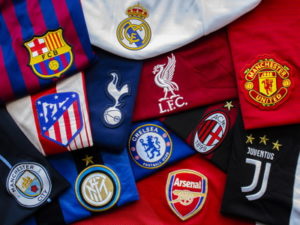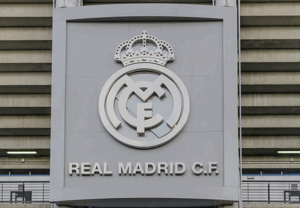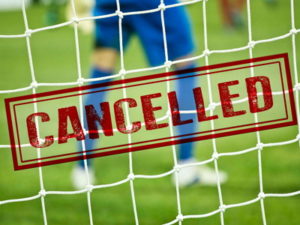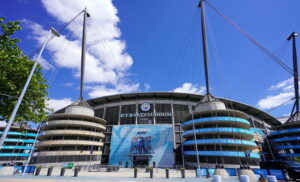Champions League 2024 Betting Offers
 The richest and most prestigious club football tournament in the world attracts billions of pound in revenue, with the champions able to earn an enormous £100 million overall for winning this years competition. When you’ve got that much money flowing around it means the bookies provide some of the best odds and highest value betting promotions that they can offer for the Champions League and Europa League.
The richest and most prestigious club football tournament in the world attracts billions of pound in revenue, with the champions able to earn an enormous £100 million overall for winning this years competition. When you’ve got that much money flowing around it means the bookies provide some of the best odds and highest value betting promotions that they can offer for the Champions League and Europa League.
We have selected the top Champions League, Europa League and Europa Conference League offers from the UK’s top bookies to save you having to trawl the best prices and deals. On this page you can find descriptions of the very latest and long term regular European Cup offers throughout the year for all customers, new and existing. We also list fixtures and information about the Champions League format, European Cup history, previous winners, stats and more.
Champions League Betting Offers
New Customer



Featured Offers


Get your single bets paid out if the team you back goes 2 goals ahead - for multiple bets the selection will be marked as a winner with bet365.
Applies to pre-match single and multiple bets on the standard Full Time Result market for applicable competitions. Only available to new and eligible customers. Bet restrictions and T&Cs apply. Registration required.
Existing Customer Promotions




2023-2024 Champions League Fixtures
| Round | Draw Date | First Leg | Second Leg |
|---|---|---|---|
| Match 1 | 31 August | 19-20 September | – |
| Match 2 | – | 3-4 October | – |
| Match 3 | – | 25-26 October | – |
| Match 4 | – | 7-8 November | – |
| Match 5 | – | 28-29 November | – |
| Match 6 | – | 12-13 December | – |
| Last 16 | 18 December | 13-14 & 20-21 February | 5-6 & 12-13 March |
| Quarter-Finals | 15 March | 9-10 April | 16-17 April |
| Semi-Finals | 15 March | 30 April – 1 May | 7-8 May |
| Final | – | 1 June |
2024 Knockout Stages
Semi-Finals
| Fixture | Date | Stadium |
|---|---|---|
| Bayern Munich v Real Madrid | Tuesday 30th April | Allianz Arena |
| Borussia Dortmund v PSG | Wednesday 1st May | Signal Iduna Park |
| PSG v Borussia Dortmund | Tuesday 7th May | Parc des Princes |
| Real Madrid v Bayern Munich | Wednesday 8th May | Santiago Bernabéu |
Quarter-Finals
| Fixture | Date | Stadium |
|---|---|---|
| Arsenal v Bayern Munich | Tuesday 9th April | The Emirates |
| Real Madrid v Man City | Tuesday 9th April | Santiago Bernabéu |
| Atletico Madrid v Borussia Dortmund | Wednesday 10th April | Metropolitano Stadium |
| PSG v Barcelona | Wednesday 10th April | Parc des Princes |
| Barcelona v PSG | Tuesday 16th April | Olympic Stadium |
| Borussia Dortmund v Atletico Madrid | Tuesday 16th April | Signal Iduna Park |
| Bayern Munich v Arsenal | Wednesday 17th April | Allianz Arena |
| Man City v Real Madrid | Wednesday 17th April | The Etihad |
Last 16
| Fixture | Date | Stadium |
|---|---|---|
| Copenhagen v Man City | Tuesday 13th February | Parken Stadium |
| RB Leipzig v Real Madrid | Tuesday 13th February | Red Bull Arena |
| PSG v Real Sociedad | Wednesday 14th February | Parc des Princes |
| Lazio v Bayern Munich | Wednesday 14th February | Stadio Olimpico |
| Inter Milan v Atletico Madrid | Tuesday 20th February | San Siro |
| PSV v Borussia Dortmund | Tuesday 20th February | Philips Stadium |
| Porto v Arsenal | Wednesday 21st February | Estádio do Dragão |
| Napoli v Barcelona | Wednesday 21st February | Diego Maradona Stadium |
| Real Sociedad v PSG | Tuesday 5th March | Reale Arena |
| Bayern Munich v Lazio | Tuesday 5th March | Allianz Arena |
| Man City v Copenhagen | Wednesday 6th March | The Etihad |
| Real Madrid v RB Leipzig | Wednesday 6th March | Santiago Bernabéu |
| Arsenal v Porto | Tuesday 12th March | The Emirates |
| Barcelona v Napoli | Tuesday 12th March | Olympic Stadium |
| Atletico Madrid v Inter Milan | Wednesday 13th March | Metropolitano Stadium |
| Borussia Dortmund v PSV | Wednesday 13th March | Signal Iduna Park |
2023 Group Stages
Group A
| – | Bayern Munich | Man United | Copenhagen | Galatasaray |
|---|---|---|---|---|
| Bayern Munich | – | 20/09 | 29/11 | 08/11 |
| Man United | 12/12 | – | 24/10 | 03/10 |
| Copenhagen | 03/10 | 08/11 | – | 12/12 |
| Galatasaray | 24/10 | 29/11 | 20/09 | – |
Group B
| – | Sevilla | Arsenal | PSV | Lens |
|---|---|---|---|---|
| Sevilla | – | 24/10 | 29/11 | 20/09 |
| Arsenal | 08/11 | – | 20/09 | 29/11 |
| PSV | 29/11 | 12/12 | – | 08/11 |
| Lens | 12/12 | 03/10 | 24/10 | – |
Group C
| – | Napoli | Real Madrid | Braga | Union Berlin |
|---|---|---|---|---|
| Napoli | – | 03/10 | 12/12 | 08/11 |
| Real Madrid | 29/11 | – | 08/11 | 20/09 |
| Braga | 20/09 | 24/10 | – | 29/11 |
| Union Berlin | 24/10 | 12/12 | 03/10 | – |
Group D
| – | Benfica | Inter Milan | RB Salzburg | Real Sociedad |
|---|---|---|---|---|
| Benfica | – | 29/11 | 20/09 | 24/10 |
| Inter Milan | 03/10 | – | 24/10 | 12/12 |
| RB Salzburg | 12/12 | 08/11 | – | 03/10 |
| Real Sociedad | 08/11 | 20/09 | 29/11 | – |
Group E
| – | Feyenoord | Atlético Madrid | Lazio | Celtic |
|---|---|---|---|---|
| Feyenoord | – | 28/11 | 25/10 | 19/09 |
| Atlético Madrid | 04/10 | – | 13/12 | 07/11 |
| Lazio | 07/11 | 19/09 | – | 28/11 |
| Celtic | 13/12 | 25/10 | 04/10 | – |
Group F
| – | PSG | Dortmund | AC Milan | Newcastle |
|---|---|---|---|---|
| PSG | – | 19/09 | 25/10 | 28/11 |
| Dortmund | 13/12 | – | 04/10 | 07/11 |
| AC Milan | 07/11 | 28/11 | – | 19/09 |
| Newcastle | 04/10 | 25/10 | 13/12 | – |
Group G
| – | Man City | RB Leipzig | Red Star Belgrade | Young Boys |
|---|---|---|---|---|
| Man City | – | 28/11 | 19/09 | 07/11 |
| RB Leipzig | 04/10 | – | 25/10 | 13/12 |
| Red Star Belgrade | 13/12 | 07/11 | – | 04/10 |
| Young Boys | 25/10 | 19/09 | 28/11 | – |
Group H
| – | Barcelona | Porto | Shakhtar Donetsk | Royal Antwerp |
|---|---|---|---|---|
| Barcelona | – | 28/11 | 25/10 | 19/09 |
| Porto | 04/10 | – | 13/12 | 07/11 |
| Shakhtar Donetsk | 07/11 | 19/09 | – | 28/11 |
| Royal Antwerp | 13/12 | 25/10 | 04/10 | – |
2024 Champions League Final
| Fixture | Date | Stadium |
|---|---|---|
| ? v ? | Saturday 1st June | Wembley Satdium, London |
2024 Europa League Final
| Fixture | Date | Stadium |
|---|---|---|
| ? v ? | Wednesday 22nd May | Aviva Stadium, Dublin |
2024 Europa Conference League Final
| Fixture | Date | Stadium |
|---|---|---|
| ? v ? | Wednesday 29th May | Agia Sophia Stadium, Athens |
Champions League Format
Qualifying
 After a lot of initial chopping and changing the Champions League qualification format has remained roughly unchanged since 2008. Teams either qualify directly or enter into pre-knock-out rounds for a place in the final 32.
After a lot of initial chopping and changing the Champions League qualification format has remained roughly unchanged since 2008. Teams either qualify directly or enter into pre-knock-out rounds for a place in the final 32.
Automatic qualification is dependent on the UEFA coefficient ranking of that countries league combined with league position.
Prior to the start of the 2016/17 campaign it was announced the Champions League qualification format will change for the 2018/19 season. This will now see the top four teams from the top 4 ranked association countries, Germany, England, Spain and Italy, automatically qualify for the group stages with no play offs.
This will no doubt make it harder to qualify for teams not from the top four leagues in favour of more historically recognised teams. This will also be coupled with a further dramatic increase in prize money.
I’m sure UEFA would say this is designed to increase the quality of the competition but in actuality it all comes down to cash. UEFA know they can sell TV rights for more money if Man United are playing instead of FC Rostov. This move is also designed to temper the idea of a new European Super League that would directly compete with the Champions League.
The association ranked 5th (this year being France) will receive 3 automatic qualification spots. The 6th ranked association (Russia) will receive 2 automatically spots and then the champions from associations 7-11 (Portugal, Ukraine, Belgium, Turkey & Netherlands) will receive one spot each. This makes up 26 of the 32 group stage places.
The Champions League winners and Europa league winners from last season also receive an automatically group place, however if these teams have already qualified through their league it means all the remaining places are available to qualifiers.
The remaining 6 places are made up from the qualifying rounds. Qualification takes place in two steams. The Champions stream is a knock out between the league winners of the 14th to 54th UEFA ranked league, these enter between the 1st round to the third round based on UEFA rankings. The remaining 6 teams in this path after the third round enter then the play-off round.
The league stream contains the rest, i.e. the runners up, third and fourth placed teams, that do not directly qualify. Teams again enter at different stages dependent on league ranking. This results in 4 teams entering the play-off round.
The play-off is therefore made up of:
- Champions of teams ranked 12th & 13th
- 6 teams from the champions stream
- 4 teams from the non-champions, league stream
These 12 teams then play a one off knockout with the 6 winners joining the other 26 direct qualifiers in the group stage.
Group Stages
 From next season the Champions League group stages will change to two groups of 16 but for now the final 32 are still split into 8 groups of 4.
From next season the Champions League group stages will change to two groups of 16 but for now the final 32 are still split into 8 groups of 4.
Teams are divided into four pots based on their own UEFA coefficient sores and each group has one team drawn from each pot. At this stage there is a protection to prevent teams from the same country being drawn together.
Clubs play home and away ties with three points for a win and one for a draw. After 6 matches the top two teams progress to the knock-out stages, the third placed team is parachuted into the final 32 of the Europa League and the fourth place team is eliminated. If teams are tied in points it goes to goal difference and then to results against.
Knock-Out Stages
 The group stages take place between September and December, there is then a break until February until the knock-out stages commence, this matches the winter break taken in many European countries.
The group stages take place between September and December, there is then a break until February until the knock-out stages commence, this matches the winter break taken in many European countries.
At the final 16 stage the country protection remains in place, meaning teams form the same league are not drawn together. Teams play two legs, home and away, with the overall winner on aggregate going through.
From 1965 until 2021 away goals counted, that meant if a match is drawn over two legs the team with the most goals away from home would go through. If teams were equal on away goals the tie would progress to extra time and penalties.
The away goals rule was brought in to encourage away teams to attack at a time when home advantage was more significant. In more recent times away goals have counted less as pitches are more consistent and advances such as VAR help equal things up. If anything the away goals rule was preventing home teams attacking in fear of conceding a goal and so UEFA abolished the law for the 2021-22 season onwards.
Both the quarter and semi-finals follow the same format although at this stage the draw is completely random as any country protection is removed.
The final takes place in mid-May each year at a venue chose prior to the start of the season. This is intended to be a neutral venue although in several instances in the past a finalist has ended up playing at their home stadium.
Format Changes For 2024-25
 For the 2024-25 season the format of the Champions League will changes again. Naturally they were never going to make it smaller and have expanded the number of teams from 32 to 36. This will result in teams that qualify now playing eight games over the course of ten weeks in a new league phase. Original proposals suggested teams would play ten league phase matches but this was reduced to eight instead.
For the 2024-25 season the format of the Champions League will changes again. Naturally they were never going to make it smaller and have expanded the number of teams from 32 to 36. This will result in teams that qualify now playing eight games over the course of ten weeks in a new league phase. Original proposals suggested teams would play ten league phase matches but this was reduced to eight instead.
The group phase will be abandoned and instead all teams will compete in a single league. Teams will play four home ties and four away ties but all against different opponents. Points are awarded as standard; 3 points for a win and 1 for a draw with goal difference and then goals scored coming into play if teams are tied.
The top eight teams in the league go straight through to the last 16, teams places 9th to 24th enter into a two-legged play-off round with 9th-16th teams seeded in that draw. The winners of the play-off ties join the other 8 in the last 16. The knockout stage is played as before.
The qualification system will work in the same way for the original 32 places. The additional four places will be filled as follows:
- An additional place to the 3rd placed team in the country ranked 5th in the UEFA ranking
- An additional place for a domestic league champion through the ‘Champions Path
- Two places awarded to the countries that performed the best in the previous season of UEFA competitions (how those places will be allocated remains to be seen and it may be up to the countries themselves to give out the sports, such as to the 5th placed team in the league or to the winners of the domestic cup).
Plans to award two places to teams with the highest UEFA coefficients who did not qualify were also abandoned on the basis it would act a safety net to the bigger teams who have a bad season.
The idea behind the changes being flouted is it will give teams more to play for for longer in the league phase vs the group phase. In reality we know that the real reason is it adds at two extra games for each team along with a whole play-off round of 16 fixtures. This gives them more matches to sell as part of TV and commercial deals.
Quite how this is supposed to fit in with already hectic domestic and international schedules along with a new enlarged club world cup and an enlarged World Cup remains to be seen. Similar plans are being rolled out for the Europa League (8 game league phase) and Europa Conference League (6 game league phase), both of which will have 36 berths.
Previous Winners
| Year | Winner | Host City |
|---|---|---|
| 2024 | ? | London |
| 2023 | Manchester City | Istanbul |
| 2022 | Real Madrid | Paris |
| 2021 | Chelsea | Porto |
| 2020 | Bayern Munich | Lisbon |
| 2019 | Liverpool | Madrid |
| 2018 | Real Madrid | Kiev |
| 2017 | Real Madrid | Cardiff |
| 2016 | Real Madrid | Milan |
| 2015 | Barcelona | Berlin |
| 2014 | Real Madrid | Lisbon |
| 2013 | Bayern Munich | London |
| 2012 | Chelsea | Munich |
| 2011 | Barcelona | London |
| 2010 | Inter Milan | Madrid |
| 2009 | Barcelona | Rome |
| 2008 | Manchester United | Moscow |
| 2007 | AC Milan | Athens |
| 2006 | Barcelona | Saint-Denis |
| 2005 | Liverpool | Istanbul |
| 2004 | Porto | Gel’kirchen |
| 2003 | AC Milan | Manchester |
| 2002 | Real Madrid | Glasgow |
| 2001 | Bayern Munich | Milan |
| 2000 | Real Madrid | Saint-Denis |
| 1999 | Manchester United | Barcelona |
| 1998 | Real Madrid | Amsterdam |
| 1997 | Borussia Dortmund | Munich |
| 1996 | Juventus | Rome |
| 1995 | Ajax | Vienna |
| 1994 | AC Milan | Athens |
| 1993 | Marseille | Munich |
| 1992 | Barcelona | London |
| 1991 | Red Star BVelgrade | Bari |
| 1990 | AC Milan | Vienna |
| 1989 | AC Milan | Barcelona |
| 1988 | PSV Eindhoven | Stuttgart |
| 1987 | Porto | Vienna |
| 1986 | Steaua Bucharest | Seville |
| 1985 | Juventus | Brussels |
| 1984 | Liverpool | Rome |
| 1983 | Hamburg | Athens |
| 1982 | Aston Villa | Rotterdam |
| 1981 | Liverpool | Paris |
| 1980 | Nottingham Forest | Madrid |
| 1979 | Nottingham Forest | Munich |
| 1978 | Liverpool | London |
| 1977 | Liverpool | Rome |
| 1976 | Bayern Munich | Glasgow |
| 1975 | Bayern Munich | Paris |
| 1974 | Bayern Munich | Brussels |
| 1973 | Ajax | Belgrade |
| 1972 | Ajax | Rotterdam |
| 1971 | Ajax | London |
| 1970 | Feyenoord | Milan |
| 1969 | AC Milan | Madrid |
| 1968 | Manchester United | London |
| 1967 | Celtic | Lisbon |
| 1966 | Real Madrid | Brussels |
| 1965 | Inter Milan | Milan |
| 1964 | Inter Milan | Vienna |
| 1963 | AC Milan | London |
| 1962 | Benfica | Amsterdam |
| 1961 | Benfica | Bern |
| 1960 | Real Madrid | Glasgow |
| 1959 | Real Madrid | Stuttgart |
| 1958 | Real Madrid | Brussels |
| 1957 | Real Madrid | Madrid |
| 1956 | Real Madrid | Paris |
Most Successful European Cup Teams
| Team | Number Wins | Years |
|---|---|---|
| Real Madrid | 14 | 2022, 2016-18, 2014, 2002, 2000, 1998, 1966, 1956-1960 |
| AC Milan | 7 | 2007, 2003, 1994, 1990, 1989, 1969, 1963 |
| Liverpool | 6 | 2019, 2005, 1984, 1981, 1977, 1978 |
| Bayern Munich | 6 | 2020, 2013, 2001, 1974-1976 |
| Barcelona | 5 | 2015, 2011, 2009, 2006, 1992 |
| Ajax | 4 | 1995, 1973, 1972, 1971 |
| Inter Milan | 3 | 2010, 1965, 1964 |
| Manchester United | 3 | 2008, 1999, 1968 |
| Juventus | 2 | 1996, 1985 |
| Benfica | 2 | 1962, 1961 |
| Nottingham Forest | 2 | 1980, 1979 |
| Porto | 2 | 2004, 1987 |
| Chelsea | 2 | 2012, 2021 |
| Celtic | 1 | 1967 |
| Hamburg | 1 | 1983 |
| Steau Bucharest | 1 | 1896 |
| Marseille | 1 | 1993 |
| Borussia Dortmund | 1 | 1997 |
| Feyenoord | 1 | 1970 |
| Aston Villa | 1 | 1982 |
| PSV Eindhoven | 1 | 1988 |
| Red Star Belgrade | 1 | 1991 |
| Manchester City | 1 | 2023 |
Most Successful English Teams
| Team | European Cups | 2nd Place | Played / Won | % Wins |
|---|---|---|---|---|
| Liverpool | 6 | 4 | 248 / 144 | 58.06% |
| Manchester United | 3 | 2 | 293 / 160 | 54.61% |
| Nottingham Forest | 2 | 0 | 20 / 12 | 60% |
| Chelsea | 2 | 1 | 201 / 104 | 51.74% |
| Aston Villa | 1 | 0 | 15 / 9 | 60% |
| Man City | 1 | 1 | 119 / 66 | 55.46% |
| Leeds United | 0 | 1 | 39 / 21 | 53.84% |
| Arsenal | 0 | 1 | 201 / 101 | 50.25% |
| Tottenham | 0 | 1 | 63 / 28 | 44.44% |
Data current to end of 2022 Campaign and includes European Cup and Champions League
Future Champions League Final Venues
| Year | Stadium | City | Country | Previous Finals |
|---|---|---|---|---|
| 2024 | Wembley | London | UK | 2011, 2013 (1963, 1968, 1971, 1978, 1992: Old Wembley) |
| 2025 | Allianz Arena | Munich | Germany | 2012 |
History of the European Cup / Champions League
Early Days
 In similar fashion to the European Championships the creation of a Europe wide club competition was largely delayed for political reasons brought about by the second world war. By the mid 1950’s most other continents had a national club competition and as with the origin of the Euros it was the French that pushed through a European Club Cup.
In similar fashion to the European Championships the creation of a Europe wide club competition was largely delayed for political reasons brought about by the second world war. By the mid 1950’s most other continents had a national club competition and as with the origin of the Euros it was the French that pushed through a European Club Cup.
Smaller tournaments existed both before and after WWII but these were restricted, such as the Challenge Cup between teams in the Austro-Hungarian empire and the Latin Cup in which Mediterranean clubs competed.
After a visiting the South American Championship of Champions two journalists at the French publication L’Equipe championed the creation of a similar tournament in Europe. This eventually culminated in the creation of the European Champions of Clubs’ Cup in 1995.
Initially 16 clubs competed in a knock-out cup. The first European Cup saw Scottish champions Hibernian compete but at this time the English FA banned the English champions Chelsea from entering. The first final was held in Paris in 1955 and was won 4-3 by Real Madrid.
European Cup
 The following year in 1956 Manchester United decide to enter the Cup against the advice of the FA. This did nothing to dent the dominance of Real Madrid who won consecutive titles in 1956. In 1957 on of the biggest ever strategies in football occurred to the Manchester United squad. Flying back victorious from a semi-final against Red Star Belgrade the club plane crashed during a fuel layover in Munich, the resulting fire killed 23/44 on board including many of the ‘Busby Babes’. It took Manchester United over ten years to recover from the disaster.
The following year in 1956 Manchester United decide to enter the Cup against the advice of the FA. This did nothing to dent the dominance of Real Madrid who won consecutive titles in 1956. In 1957 on of the biggest ever strategies in football occurred to the Manchester United squad. Flying back victorious from a semi-final against Red Star Belgrade the club plane crashed during a fuel layover in Munich, the resulting fire killed 23/44 on board including many of the ‘Busby Babes’. It took Manchester United over ten years to recover from the disaster.
Real Madrid continued to dominate in the early days winning all of the first five European Cups to 1960. Benfica then won two consecutive titles before AC Milan won in 1963 followed by Inter Milan in 1964 and 1965 and Real Madrid again in 1966.
1967 saw the first ever British Champions in Celtic that started a 15 year spell of British success in the European Cup. Manchester United won the cup in 1968 ten years after the Munich disaster. This was followed period of Dutch success in the early 1970’s that included Celtic beaten by Feyenoord in the 1970 final before Ajax won three European Cups on the bounce between 1971-1973. It was Bayern Munich’s turn next as they won the cup three years back to back from 1974-76.
The most successful manager in European Cup history, Bob Paisley, lead the most successful British club in Europe, Liverpool, to their first title in 1977 beating Borussia Monchengladbach in Rome 3-1. Liverpool won the title back to back beating Real Madrid 1-0 at Wembley in 1978 before Brian Clough’s Nottingham Forest became the only team to win the European Cup more times than their own domestic league winning back to back in 1970 (Vs Malmo) and 1980 (Vs Hamburg).
Liverpool took the crown back in 1981 beating Real Madrid 1-0 in Paris before Aston Villa got in on the act winning their first an only title in 1982. Hamburg won in 1983 before Liverpool grabbed their fourth crown with a 1-0 victory over Roma at their home stadium in Rome.
The Heysel disaster in 1985 saw British clubs banned from Europe for 5 years. Disruption in the Liverpool section of the stadium in the final against Juventus led to a wall collapsing killing 39 mainly Italians. The match carried on but Liverpool lost 1-0 on the night.
The vacuum left by the absence of English teams meant no one dominated with 6 clubs winning the following 7 titles up to 1992.
The Champions League
 In 1993 the old European Cup was changed to the Champions League. The money and prestige that went with this has helped to make the competition one of the most watched and most valuable in the world.
In 1993 the old European Cup was changed to the Champions League. The money and prestige that went with this has helped to make the competition one of the most watched and most valuable in the world.
Marseille won the first and only title for a French team in 1993. They were banned the following year and stripped of their Ligue 1 title following match fixing allegations against their chairman, Bernard Tapie.
AC Milan won in 1994 followed by Ajax in 1995, Juventus in 1996 and Borrusia Dortmund in 1997. In 1998 Real Madrid won their 7th title after a 32 year gap. This was also the first year that non-champions were allowed entry to the competition.
Manchester United won their second title in 1998 beating Bayern Munich 2-1 with two injury time goals. They were the first team to win the cup having not been Champions of their own league, they also still hold the record for winning the cup with the fewest victories, five.
Real Madrid began a new era of dominance winning in 2000 and 2002, Bayern won in 2001, Milan got their 6th crown in 2003 and Porto were victors in 2004. Liverpool won their 5th European Cup in 2005 beating AC Milan on penalties in Istanbul following a 3-3 draw. This is cited as the most exciting ever European final with underdogs Liverpool down and out 3-0 down at half time, they scored 3 goals in 7 minutes during the second period and went on to win the shoot-out.
The last ten years or so have been dominated by Italy, Spain and England. Barcelona have emerged as the new dominant force winning in 2006 (Vs Arsenal), 2009 (Vs Juventus), 2011 (Vs Manchester United) and 2015 (Vs Juventus). Real Madrid not to be outdone claimed ‘La Decima’ winning the European Cup for the 10th time in 2014 beating rivals Atletico in the final.
AC Milan got revenge on Liverpool beating them in the 2007 final and Bayern Munich became the only German team to win since 2001 by beating rivals Borrusia Dortmund in the 2013 final at Wembley.
Real Madrid Dominate Again
 The 2016 final was held at the San Siro in Milan in a repeat of the 2014 final between local rivals Real Madrid and Atletico Madrid. Madrid took the game on penalties to win the trophy for an amazing 11th time leaving Atletico heart broken yet again. The 2017 final was played at the Principality Stadium in Cardiff but it was Real Madrid, and Ronaldo in particular, who dominated yet again, beating Juventus to win their second title in a row, and 12th in total.
The 2016 final was held at the San Siro in Milan in a repeat of the 2014 final between local rivals Real Madrid and Atletico Madrid. Madrid took the game on penalties to win the trophy for an amazing 11th time leaving Atletico heart broken yet again. The 2017 final was played at the Principality Stadium in Cardiff but it was Real Madrid, and Ronaldo in particular, who dominated yet again, beating Juventus to win their second title in a row, and 12th in total.
The 2018 Champions League was played in the Olimpiyskiy National Sports Complex, Kiev Ukraine. Liverpool impressed getting to the final with one of the highest goal tally’s ever. It was however Madrid who won yet again for the third successive year in a row, 13th time in total, following a spectacular over head kick goal from Welshman Gareth Bale and two horrendous mistakes by Liverpool’s goalkeeper.
The 2019 final was held in Madrid and it was hard to see Real not winning it for the fourth time in a row in their local rivals stadium, Atletico Madrid’s Wanda Metropolitano. It was however Liverpool in the end who reached the final to avenge their 2018 defeat and they gained their sixth European crown beating Tottenham 2-0 in a lackluster all English Final.
Despite the fact the final was forgettable the journey was not with both Liverpool and Spurs staging amazing semi-final comebacks. There were more games won from behind in this season that some regard it was the best campaign ever for excitement (if you are a neutral).
In 2022 Real Madrid were far from the best team in Europe but the record winners always seem to find a way to win. They defeated PSG, Chelsea and Man City as underdogs, all involving dramatic comebacks, to meet Liverpool again in a heavyweight final. Madrid were again the underdogs and dominated by Liverpool but managed to find the crucial goal for a 1-0 win to take their 14th European Cup home. The final was moved from St Petersburg to Paris in light of Russia’s invasion of Ukraine.
2020 & 2021 Special Years
 The corona virus outbreak in 2020 saw the cancellation of football in March, right in the middle of the last 16 second legs. Football did not resume until June at which point UEFA opted to complete the Champions League over two weeks in a single leg knockout competition from the quarter-finals onwards, with all matches held in Lisbon.
The corona virus outbreak in 2020 saw the cancellation of football in March, right in the middle of the last 16 second legs. Football did not resume until June at which point UEFA opted to complete the Champions League over two weeks in a single leg knockout competition from the quarter-finals onwards, with all matches held in Lisbon.
Bayern Munich won their sixth title against PSG in the latest ever final (23rd August) but the year will be remembered most for the special circumstances. One of the big benefits to come from this was how much people enjoyed the single-leg rounds and intense knockout stage, that could perhaps lead to changes in the future for the competition, which has always struggled with balancing fixture congestion for clubs.
Much of the 2020-21 season was also held behind closed doors with the competition starting late due to the delayed end to the 2020 campaign. The lack of fans and compacted domestic and European schedules meant many of the top teams faltered. Man City reached their first final, at last, in an all English affair against Chelsea, who were not expected to get that far. City were favourites but the occasion got the better of them and it was Chelsea, with their new manager Thomas Tuchel who had only taken over in January, who took their second title. PSG will be particularly annoyed given Tuchel failed to win it with them, including losing the 2020 final, but was able to get over the line with Chelsea at the first attempt.
City & Pep Finally Get Their European Cup
 There was no real doubt that Pep Guardiola’s Manchester City were the best and most expensive team on the planet but many felt they would never be seen as one of the greatest until they won the famous ‘big ears’ trophy. After losing to Chelsea in 2021, where many accused Pep of overthinking his tactics, it was thought City may end up being another PSG – an assembly of the worlds best players but incapable of winning the biggest prize in club football. Those doubts were put to bed in 2023.
There was no real doubt that Pep Guardiola’s Manchester City were the best and most expensive team on the planet but many felt they would never be seen as one of the greatest until they won the famous ‘big ears’ trophy. After losing to Chelsea in 2021, where many accused Pep of overthinking his tactics, it was thought City may end up being another PSG – an assembly of the worlds best players but incapable of winning the biggest prize in club football. Those doubts were put to bed in 2023.
Man City beat Inter Milan 1-0 in what was a fairly boring game, although finals tend to be. While they couldn’t match the magic of Liverpool in 2005 inside the Ataturk Stadium in Istanbul no one will really care as it means City are now off the mark and have joined the other five English teams to have won the European Cup.
Not only did they win the Champions League but they also won the league and FA Cup becoming only the second team, after their city rivals Man United, to win the treble. Will this be City’s only European Cup? That seems doubtful and having won one will they now go on to dominate the tournament?
2023 Knockout Stages
2023 Champions League Final
| Fixture | Date | Stadium |
|---|---|---|
| Man City v Inter Milan | Saturday 10th June | Atatürk Olympic Stadium, Istanbul |
2023 Europa League Final
| Fixture | Date | Stadium |
|---|---|---|
| Sevilla v Roma | Wednesday 31st May | Puskás Aréna, Budapest |

 ;
; ;
; ;
; ;
;

